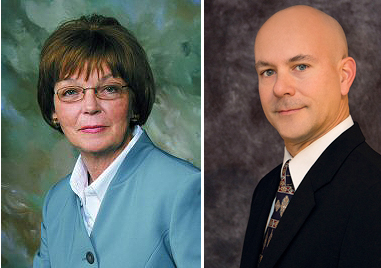Money from afar fueling state Senate race crucial for party control

By Rachel Martin | Watchdog.org
PITTSBURGH — Even in a relatively rural district in southwestern Pennsylvania, it’s distant money that is fueling the campaign in Senate District 32.
CONTESTANTS: Deberah Kula and Pat Stefano are collecting major contributions to their Pennsylvania Senate race.
The outside interest isn’t a surprise, considering it’s one of the few districts that will determine which party controls the chamber. State Sen. Rich Kasunic, D-Fayette, is retiring, leaving Republicans hungry to pick up one of the most conservative areas represented by a Democrat.
It’d be a big win — considering Democrats have controlled the seat for the past 67 years — and one of the top Republican senators is pumping money into the race in hopes of swinging the seat to the GOP.
Senate President Pro Tempore Joe Scarnati, R-Jefferson, has buoyed Republican nominee Pat Stefano‘s campaign with $535,000 in contributions, according to campaign records. And two other senators added a combined $225,000.
Campaign records show that, of the $1.4 million Stefano has raised, 96 percent is from donations over $1,000. Of those higher donations, only 4 percent came from the actual district or close by.
The same story applies to the Democratic candidate, Deberah Kula, who is vying for the state Senate after representing the 52nd House District for the past eight years.
Of the slightly more than $1 million Kula has raised during this election cycle, 84 percent is from donations exceeding $1,000.
Only 3 percent of those higher donations was donated by individuals or groups in or very near her district. Nearly half of that came from labor union political action committees, and another $355,000 in money, campaign materials or postage came from the state Senate Democratic Campaign Committee or the state Democratic Party.
MONEY FROM AFAR: The vast majority of campaign contributions for Democratic candidate Deb Kula come from outside the district.
Kasunic is one of six senators retiring this year — and Republicans hold the Senate by a four-seat margin.
Terry Madonna, director of the Center for Politics and Public Affairs at Franklin and Marshall College, said the money spent on the race so far is “a huge amount of money for a mostly rural district.”
The money, he said, is being invested in the district because not only is the control of the Senate at stake, but its one of the few truly competitive races on the ballot.
The district covers all of Fayette and Somerset counties and a portion of Westmoreland County. Both candidates are lifelong residents of Fayette County.
CLICK HERE TO SEE CAMPAIGN CONTRIBUTIONS OF $1,000 OR MORE BY REGION
Before her election to the General Assembly, Kula was a district judge and court administrator before that.
Kula’s campaign did not respond to questions about campaign finances.
Stefano is a political newcomer who owns and runs Stefano’s Printing, a business started by his grandparents in 1958.
Stefano’s campaign manager Ben Wren said that “Stefano isn’t part of the political system and can’t be bought by the political system. … Those who have invested in his campaign are investing in a state senate candidate who will go to Harrisburg and do what’s right for his constituents.”

SIMILARLY … : The bulk of Republican candidate Pat Stefano’s larger contributions also come from outside the district, mostly from prominent state senators.
One of Stefano’s Printing’s specialties is campaign swag — from magnetic vehicle signs to sunblock. And while Stefano hasn’t used his company to actually print his mailers, Wren said Stefano’s “experience as a small business owner has helped on design, on content and on connecting with people. He understands what it’s like to struggle to make ends meet at his business and at home.”
The injected money also has fueled the increasingly nasty campaign ads — Stefano questioning taxpayer-funded perks that Kula has taken, including travel reimbursements to and from the state Capitol, and Kula dredging up a 25-year-old Stefano conviction for retail theft. And more recently, Pittsburgh TV station WTAE’s fact-check of a recent attack ad on Stefano found parts of it misleading and false.
While the campaign is disproportionately expensive, campaigns have increasingly cost more. In the 2010 election cycle, the average Pennsylvania senatorial candidate raised $212,502.
Madonna said that during the past 40 years, there has been a trend away from donations from local individuals and organizations, toward party groups, lobbyists and political-action committees.







